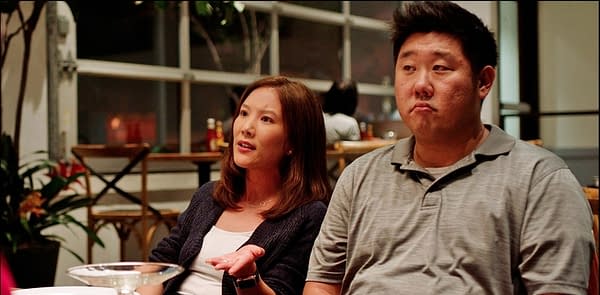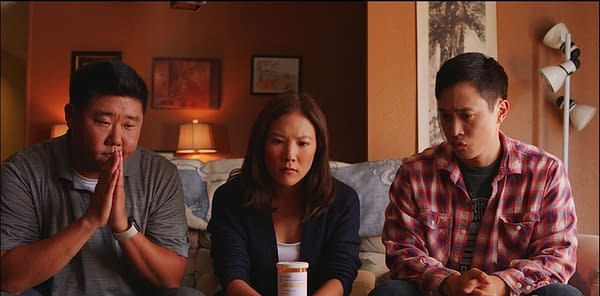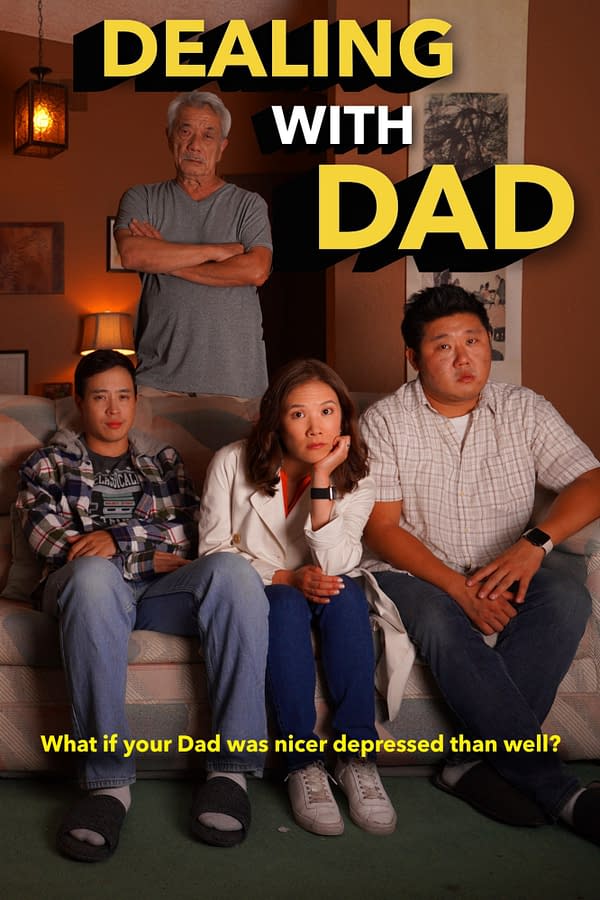Dealing with Dad Director on Confronting a Culture Taboo of Depression
Posted in: Exclusive, Movies | Tagged: Ally Maki, Dealing with Dad, exclusive, interview, Screen Media, Tom Huang
Director and writer Tom Huang (Find Me) talks to Bleeding Cool about his latest dramedy in Dealing with Dad, depression & more.
Sometimes to deal with the most serious subjects, you must be novel in the approach. In the case of Screen Media’s Dealing With Dad, director, writer, and star Tom Huang (Find Me, Unusual Targets) found a way to confront the Asian cultural taboo of mental health and depression. The film follows Margaret Chang (Ally Maki) as she reluctantly returns to her hometown and her hapless brothers to deal with the sudden depression of their jerk of a dad. As it turns out, he’s more sociable and depressed than well, and the siblings wonder if they should even get him better as they struggle to find a solution. Huang spoke to Bleeding Cool about his inspiration, leaning more on comedians to tell a serious story and the growing acceptance of storytelling.

Dealing with Dad: Telling a Grounded Story Through Comedy
Bleeding Cool: What’s the inspiration behind ‘Dealing with Dad?’
Huang: The film is based on my experience trying to get my dad out of depression. It took about eight years, partly because I didn’t understand what depression was. The other part that took longer was trying to get his friends and family to realize that this was a disease, not an emotion that would disappear. It’s harder for me to get my parents to go to the hospital, to break their leg, or get a concussion or something. Depression, especially in Asian American communities, isn’t even considered a problem. It’s regarded as a weakness a lot. Getting to understand that this wasn’t just going to go away, that he needed to see a doctor and get treated like the flu or something. It wasn’t easy, but getting them on board made it easier to help get support. After that experience, I wanted to make a movie and entertain and hopefully start a discussion about depression and get people to do something about it instead of letting it fester.
Was the story solely based on your personal experience or a collection of them?
When I first wrote the script, it was based on a Chinese American man like me because I was like, “I would tell my story, but after about two or three scenes, I realized they’d be like ten times more interesting if the main character is female because of all the crap that Chinese daughters must put up with not being the one or not being a son. They’re the ones in the clean up the mess in the end. Once I did that, it made the script ten times more interesting.
I based much of this on my experience but also from a solid female perspective and made it enjoyable. The actual depression parts were firmly based on what I did with my dad. The other parts of the siblings are sitting around talking about stuff that’s based on my cousins and brother. The conversation we have every time we go home for the holidays and sit around and talk crap at each other, catch up, and reconnect again. Those are times I love because they’re fun and enlightening, and I wanted to bring that to these siblings in the script as well.

How casting came together?
This film doesn’t work unless the main lead can be funny, dramatic, and command the screen. Our main first goal was to find Margaret, and then we knew that everything was our place afterward. Ally Maki was someone I’ve been watching for a long time. I saw her on this TV show called ‘Wrecked,’ where she’s hilarious and sharp, and anytime she’s on a screen, she commands it.
Watching her, I said, “That’s the power I want for Margaret.” In many of these roles, the critical thing is some comic timing. I had to find people that were funny but could also be dramatic. I always find it easier to find funny actors first and then transition to dramatic scenes instead of good, dramatic actors. It’s harder to find dramatic actors who understand humor and comic timing. I look for people I can see who can be funny first and then explore to see if they do the dramatic stuff. Ali certainly met those criteria. Fortunately, when we sent her the script, she liked and connected with it.
We had a meeting afterward, and she told me, “I connect with the script because, at our last holiday meal, my brothers got into a fistfight,” and I was like, “Great! Her family screwed up. This is perfect.” She also had a personal connection to this kind of dysfunctional family that she brought to the script and the other characters. Other things fell into place. She asked me in our meeting, like, “Who are you thinking about casting for the brothers.” I said, “For the youngest, I was hoping we could get Hayden Szeto on board.” She’s like, “I know Hayden,” and they’ve been friends for years.
Hayden read the script and got back to us a few days later, and he was interested. They already had that kind of chemistry. Besides being great actors, they knew each other. They play off each other seamlessly. We went into the audition process with Peter Kim, who plays Roy, and saw many people. Still, he was the only one who was funny first because he’s a standup comedian and comedy writer, but he also had this vulnerability to him, like this everyman look. I couldn’t find a lot of actors with that combination. He seems like one of my cousins from here or Taiwan that I could talk to and get close to. He fit that well, and we found him towards the end.
With Ali, Hayden, and Peter being hilarious and great at improv, that chemistry worked from the start. You could see it on the screen. Other people like Dana Lee, who’s a veteran actor who’s been around for years, we loved him and had seen him in the stuff. We had a mutual friend in this producer who gave him the script a few days later and got him on board. That was great, and the casting was a mix from my casting director, knowing people, and connecting others who are friends of mine who wanted to be on board.
When formulating the script and the performances, was it challenging to balance out its grounded nature without coming off like a cliche, or was it an organic process to balance the comedy and drama?
I wanted this film to feel real first. I want any humor to come out of it to come from reality and the characters’ personalities and not some set piece like a sitcom. That was one thing when I wrote the script. I wanted to make sure there were funny parts of it, but I wanted to really have it all grounded and character-based. There’s always a delicate balance with that. These actors are great improv-ers. After we did a few takes that I was satisfied with, I let them go off and, like, do a scene with improv. They brought a lot of great things too, and they got a lot of funny things to it.
After my first edit, I cut out maybe 30-40 percent of those improv scenes because it is hilarious. After all, they pulled away from the dramatic scenes, affecting character development and their relationships. It was always hard to find that balance, and what helps is watching films that I feel like had that, like Ang Lee’s work ‘Eat Drink Man Woman’ (1994), Alexander Payne’s films like ‘Nebraska’ (2013) and ‘About Schmidt’ (2002). There are also films by Billy Wilder and James Brooks, which helped me get close to these characters and feel like they’re real. There are times the laughs are terrific as well because it just feels real, and you’re with these characters and laughing with them. That’s the kind of thing I was hoping to build. In the end, it’s all about trying to make a film that I want to watch and I want to see. That’s what I end up going with as far as my final decision is how to make that balance.
When it comes to the stigma of depression, does it feel like there’s an extra layer because it’s the Asian community? Or is there a misconception culturally?
I don’t think it’s a misconception. Some studies have shown that, in Asian and Asian-American communities, immigrant families, where depression is a taboo subject and it’s a cultural thing. When you bring immigrants into the United States, not just Asian American but all immigrants, many come here because they want the American dream. They will work hard and do all they can to succeed financially in this country. That work ethic helps a lot of these immigrants succeed.
Unfortunately, things like depression and mental health are considered weaknesses. It shows, “You’re not working hard enough. You can’t let being a little sad get you. If you fail, it’s because you’re too late and little weaknesses impeded you.” Those stigmas are evident in my family, and others I talk to that mental health is something that just isn’t discussed. This film doesn’t have the answers to everyone’s issues. I meant for this to be a first step in discussing depression. That was the thing that was difficult for us as a family taking that first step. It’s not ignoring it. Let’s discuss what we can do about this and not let it sit there and rot. That’s what this film does, hopefully, give people hope that they can see that you could do something about it and know that it can be the first step to get things rolling.

The Asian-American community within the entertainment industry has seen strides with the pinnacle so far, with Oscar wins for ‘Everything, Everywhere All at Once.’ Have you seen the improved opportunities as a writer, director, and actor over the years?
The last five years have been tremendous in building Asian-American stories and their acceptance of them by studios and investors. Everyone points to ‘Crazy Rich Asians’ (2018) as it may have started a trend, but that year also, a film called ‘Searching’ (2018) came out with John Cho, a thriller. It’s about an American family dealing with a missing child. It didn’t have to be Asian-American, but those producers fought to keep John Cho in and make the character Korean American. That film was successful compared to its budget. Maybe, more so than any film that year. Another TV show called ‘Fresh Off the Boat,’ which came around that time, ended up going for six seasons. It was hilarious and well-written with great actors, now big stars in Randall Park and Constance Wu. That also showed studios and the mainstream media that we could tell Asian-American stories, and many will accept Asian Americans as subjects of stories. All those stories are as accepted as American stories.
I have seen a much more openness for people to read a script and not give me notes like, “Can we get more white people on this?” or “Can we make it a half-breed family or something?” We started looking for investing a couple of years ago for ‘Dealing with Dad.’ I found many more who want to invest in diverse films, specifically in Asian-American stories. Before was all about just finding someone who might want to be a part of an indie film, no matter what it was. In this case, so many people are now looking to increase the number of stories out there that it was heartening; one of the organizations helping me was Film Independent, which put on the Spirit Awards. That’s one of their missions, and to have them be. Find and help me make connections, develop the script, and support the work.
Easy Adventure Films and Screen Media’s Dealing with Dead, which also stars Page Leong, Echo Kellum, Karan Soni, Cindera Che, Megan Gailey, and Ari Stidham, is available in digital and on-demand.
Stay up-to-date and support the site by following Bleeding Cool on Google News today!
For all the latest Comics News Click Here
For the latest news and updates, follow us on Google News.

